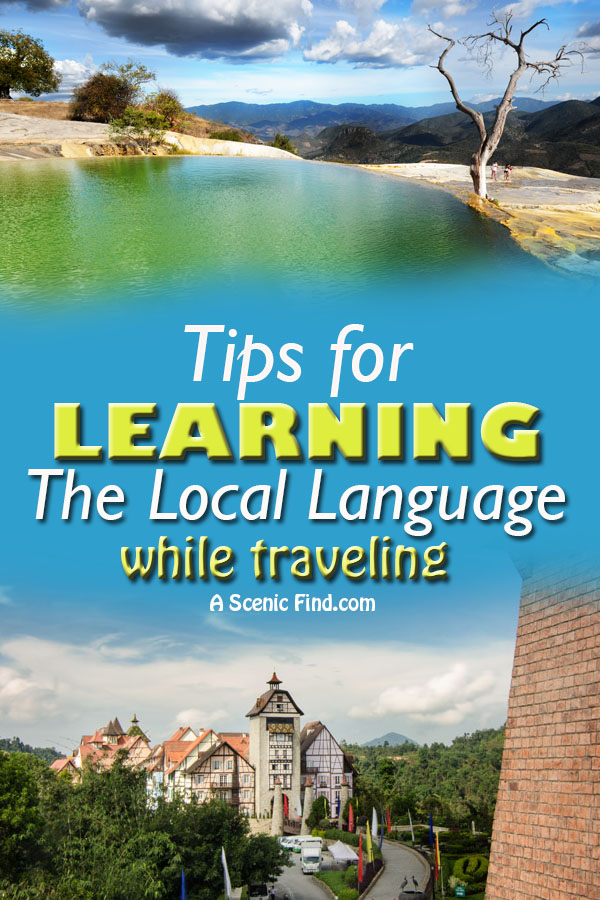Some of the links in this post are affiliate links. This means if you click on the link and purchase the item, I may receive an affiliate commission at no extra cost to you.
When I first arrived in Mexico all I could say was ‘hello’ and ‘bye’ in Spanish.
I’ve spent almost 6 months here in Mexico, with my Spanish gradually improving. I’m nowhere near the stage where I can have an in-depth conversation with somebody, but it’s enough for me to order food, and do that ever so important thing of eating.
So I suppose it’s a small moral victory, go me!
Pin it 🙂

I would have learnt more Spanish prior to arriving, but you see I’m terribly unorganised an the process of planning an exchange while studying at university was pretty time consuming. So I was a little underprepared when it came to speaking Spanish due to the swiftness which I arrived into Mexico.
But from hindsight there are several things I would have learnt, or at least placed more emphasis on prior to coming in regards to speaking certain key phrases in a new language, not just Spanish.
It must be said that in Australia the majority of anglo-white Australians like myself do not know a second language. Language is taught in schools, mostly in primary school as a compulsory subject, but in high school it is an elective.
So not a lot of people choose to study language in high school. Whilst in primary school I can only speak for myself in this regard, but I wasn’t thinking that I was going to need the language I learnt as I would never get the opportunity to travel.
There are other factors at play as well as to why a person would be, or are least not interested in learning a second language, but that is a discussion for another time. Through my experience I should be able to help you to the point where getting around should be a lot easier.
1 – Learn the sounds of the alphabet

This was my first point of call when I first began to learn Spanish, and the reason is simple. I figured I would struggle to remember words, not know the correct intonations of the language and speech patterns of Spanish, even if I’m directly reading from a phrase book.
So wanting others to understand what you want to communicate is very important. When you first arrive to your destination there will be new sounds, new smells, to the point where things may seem overwhelming, especially if it’s your first time travelling abroad.
There is a lot of new information to process, and that’s on top of needing to negotiate your way around the city and find food to eat! This can be a very stressful part of the trip.
As you will have very little understanding on this new language and have a limited vocabulary, it’s best to be able to say your words correctly and be as efficient as possible. This way it will alleviate additional and unwarranted stress.
Learn by going through each letter and learning how the letters sound. The added bonus of learning via this method is that when you’re stuck, and needing to read something from your phrase book, you can break down the word, almost like when you first begin to read.
2 – Learn the numbers

Everything you do will be based around numbers, and this is mostly to do with purchasing goods. Whether this is simply purchasing something in a market, a hotel room, getting a quote for a taxi, or even money exchange.
Sure you can write down the number if there is any confusion, which is more than likely to happen when you’re first learning a language. But there will be moments where it may be a pen and paper may not be available.
So the importance of learning number cannot be understated.
3 – Key sentences

Besides from the obvious words to learn in a new language of ‘hello’ and ‘goodbye’, it pays to learn several others words and sentences.
Can I have… or I would like… – This can be used for practically anytime you would want to order something. Whether that is from a restaurant, or simply from a corner store. The importance of this sentence has served me quite well.
Does this …. (insert bus or train) go to…. (destination) or Where is the … (insert bus or train) for …. (destination) ? – For obvious reasons, if you’re going to be travelling you will need to be able know which is the correct transport to get to where you want to go. Otherwise you may be having an unexpected journey.
How much is this? – Part of the fun of travelling is being able to purchase new exotic goods in a market place, so this is a must.
4 – Reading and Writing

If you have started to come to grips with some of the words of the language that your learning, the next best thing you can do is begin reading, or even writing. Some languages will be more difficult than others to do this with, especially if there are very little similarities from your mother tongue to the new language, ie Chinese and English.
Learning to read or write in the new language helps reinforce what is already known. Additionally it allows for you to discover new words in your own time, and see how the words are used in an appropriate context.
I recommend to begin reading children’s books as the language used will be at an introductory level.
5 – Practice

In order to become more fluent and confident the key is practice. Whether that is practice speaking the language, or practice in regards to learning new words and phrases and knowing how to put them together.
This all comes from practice, and much like everything in life, if you want to be able to perform a task well, you will require practice.
Pin it 🙂


Leave a Reply